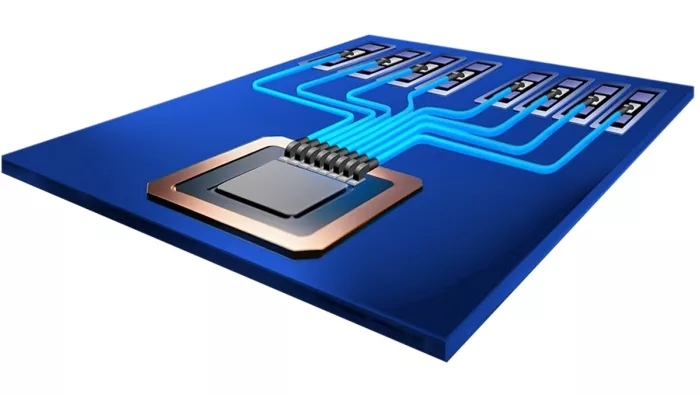Avicena Advances microLED and Photo Detector Arrays to Enable the World’s Lowest-Power AI Scale-up Optical Interconnects
Latest Avicena LightBundle technology delivers industry-leading Tx power of 80fJ/bit addressing next generation AI infrastructure requirements
St. Louis, MO — November 17, 2025 — Avicena, the leader in next-generation microLED interconnects, today announced a major milestone at SuperCompute 2025 (SC25): its LightBundle™ microLED-based links now operate at 4Gbps per lane with transmitter currents as low as 100µA per LED. At this current, each link closes at a raw BER of 1×10-12 with an equivalent energy of 80fJ/bit per LED, all without Forward Error Correction (FEC). This achievement highlights the LightBundle platform’s ability to deliver the world’s lowest-power optical interconnects for next generation AI infrastructure by addressing the increasing bandwidth, distance, and reliability requirements most efficiently.
Unlike laser-based optical engines—which cannot operate below a lasing threshold—microLEDs can scale transmit power to nearly arbitrarily low levels, limited primarily by the receiver’s signal-to-noise ratio. While silicon photonics can achieve low effective power by splitting a single external laser across many resonant modulators, microLEDs inherently generate their own light, dramatically simplifying packaging. Avicena microLED transmitters are only a few microns in size, require no temperature stabilization, and avoid complex control loops. These microscopic emitters can be arrayed at extremely high density to deliver terabits of aggregate bandwidth.
This new power-per-lane milestone was enabled by the latest Avicena high-sensitivity receiver technology, developed in collaboration with manufacturing partners and incorporating optimized photodetectors derived from high-volume image-sensor processes.
Instead of serializing low-speed on-chip data (typically around 2 Gb/s per lane) to very high-speed optical lanes, LightBundle transmits raw parallel data directly, dramatically simplifying integrated circuit (IC) input/output (I/O) architectures. This approach enables massive arrays of microLEDs to deliver unprecedented aggregate bandwidth at very low latency, low power consumption, while being easily integrated with any silicon node. LightBundle chiplet transceivers are well-suited to various packaging architectures including co-packaged optics (CPO), on-board optics (OBO), pluggable optical modules, and wide memory interconnects.
Scalable LightBundle Chiplet Platform for Memory Disaggregation
“We already demonstrated an efficient microLED link in a live demo at ECOC 2025 in September. By further optimizing our highly sensitive receivers, we have managed to further reduce the operating currents of the microLEDs and obtained Tx energy consumption down further to tens of femtojoules for this part of the link. Combined with the unique properties of microLEDs, we can achieve unmatched energy efficiency in our LightBundle interconnects,” said Rob Kalman, Chief Scientist of Avicena. “This benchmark shows the scalability of our roadmap, how microLED technology can replace legacy laser-based links with a simpler, more reliable and far lower power solution.”
This latest development builds on the ongoing work between Avicena and its hyperscale data center, AI accelerator and memory partners to enable scale-up AI cluster architectures that span multiple racks and thousands of GPUs, dramatically increasing compute performance for emerging agentic AI workloads.
Avicena at SC25
At Booth 2446, Avicena will demonstrate the critical components of its LightBundle technology platform.
About Avicena
Avicena Tech Corp. is a privately held company located in Sunnyvale, CA, developing LightBundle, a next generation optical interconnect architecture for AI/ML, HPC, sensors, 5G wireless and aerospace applications. This unique, flexible ultra-low energy technology is based on microLEDs, offering both very high bandwidth and low latency. Now, system designers can disaggregate functions like compute and memory and radically grow system throughput. Avicena’s technology is a key building block in the evolution of networking and computing that will reduce the energy impact on our planet.
For more information, visit https://avicena.tech
Related Chiplet
- Interconnect Chiplet
- 12nm EURYTION RFK1 - UCIe SP based Ka-Ku Band Chiplet Transceiver
- Bridglets
- Automotive AI Accelerator
- Direct Chiplet Interface
Related News
- Avicena Demonstrates Breakthrough Ultra-Low Power microLED Link at 200fJ/bit Tx Power
- Avicena Demonstrates 30m Reach of microLED-based LightBundle Technology at European Conference on Optical Communications
- Avicena Works with TSMC to Enable PD Arrays for LightBundle™ MicroLED-Based Interconnects
- Avicena Announces Scalable Sub-pJ/bit LightBundle™ Chiplet Interconnect with 10m Reach
Latest News
- Where co-packaged optics (CPO) technology stands in 2026
- Qualcomm Completes Acquisition of Alphawave Semi
- Cadence Tapes Out UCIe IP Solution at 64G Speeds on TSMC N3P Technology
- Avnet ASIC and Bar-Ilan University Launch Innovation Center for Next Generation Chiplets
- SEMIFIVE Strengthens AI ASIC Market Position Through IPO “Targeting Global Markets with Advanced-nodes, Large-Die Designs, and 3D-IC Technologies”